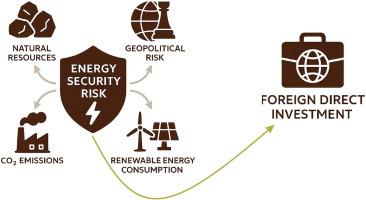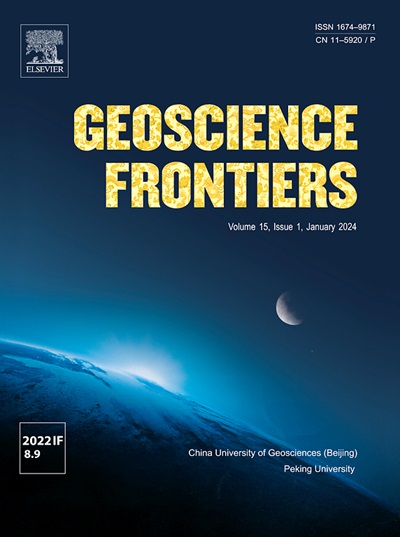十字路口的可持续发展:地缘政治风险、自然资源稀缺和能源安全转型中的可再生能源
IF 8.9
1区 地球科学
Q1 GEOSCIENCES, MULTIDISCIPLINARY
引用次数: 0
摘要
能源安全是现代社会的一个重要方面,因为它直接影响到能源的可用性、可及性和可靠性。近年来,能源安全对自然资源和地缘政治因素的依赖引起了人们的极大关注。通过将二氧化碳排放、可再生能源消费和外国直接投资作为控制变量,研究了1990年至2021年间存在地缘政治冲突风险的38个国家的自然资源和地缘政治风险。本研究的长期分析侧重于坡度异质性、Westerlund协整和动态面板数据估计。研究结果表明,能源安全指数与自然资源、地缘政治风险、二氧化碳排放和可再生能源消费等因素呈正相关。然而,在所选的38个地缘政治风险国家中,发现外国直接投资与能源安全指数呈负相关。自然资源和地缘政治风险在能源安全中的作用不容忽视。自然资源为发电和社会供电提供了原材料,而地缘政治风险可能会破坏能源供应链,威胁稳定。实现可持续能源安全需要采取综合办法,解决能源供应的两个方面。向可再生能源转型,提高能源效率,实现能源供应多样化,促进国际合作,保护自然资源,是迈向更可持续、更有韧性的能源未来的重要步骤。本文章由计算机程序翻译,如有差异,请以英文原文为准。

Sustainable development at the crossroads: Geopolitical risks, natural resource scarcity, and renewable energy in energy security transitions
Energy security is a crucial aspect of modern societies, as it directly impacts the availability, accessibility, and reliability of energy sources. The reliance on natural resources and geopolitical factors in shaping energy security has gained significant attention in recent years. Natural resources and geopolitical risk are examined in 38 countries at risk of geopolitical conflict between 1990 and 2021 by examining CO2 emissions, renewable energy consumption, and foreign direct investment as controlling variables. The long-run analysis conducted in this study focused on slope heterogeneity, Westerlund cointegration, and dynamic panel data estimation. The findings indicated that the energy security index is positively associated with various determinants, including natural resources, geopolitical risk, CO2 emissions, and renewable energy consumption. However, foreign direct investment was found to be negatively associated with the energy security index among the selected 38 geopolitical risk countries. The role of natural resources and geopolitical risk in energy security cannot be overlooked. Natural resources provide the raw materials for generating electricity and powering our societies, while geopolitical risks can disrupt energy supply chains and threaten stability. Achieving sustainable energy security requires a comprehensive approach that addresses both aspects of energy provision. Transitioning to renewable energy sources, improving energy efficiency, diversifying energy supplies, promoting international cooperation, and conserving natural resources are essential steps towards a more sustainable and resilient energy future.
求助全文
通过发布文献求助,成功后即可免费获取论文全文。
去求助
来源期刊

Geoscience frontiers
Earth and Planetary Sciences-General Earth and Planetary Sciences
CiteScore
17.80
自引率
3.40%
发文量
147
审稿时长
35 days
期刊介绍:
Geoscience Frontiers (GSF) is the Journal of China University of Geosciences (Beijing) and Peking University. It publishes peer-reviewed research articles and reviews in interdisciplinary fields of Earth and Planetary Sciences. GSF covers various research areas including petrology and geochemistry, lithospheric architecture and mantle dynamics, global tectonics, economic geology and fuel exploration, geophysics, stratigraphy and paleontology, environmental and engineering geology, astrogeology, and the nexus of resources-energy-emissions-climate under Sustainable Development Goals. The journal aims to bridge innovative, provocative, and challenging concepts and models in these fields, providing insights on correlations and evolution.
 求助内容:
求助内容: 应助结果提醒方式:
应助结果提醒方式:


